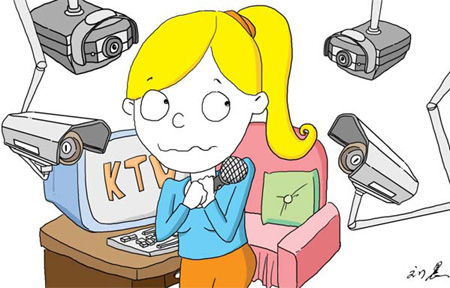Comment
With the best of intentions
By Linda Gibson (China Daily)
Updated: 2009-12-29 10:10
 |
Large Medium Small |
In the past couple of weeks, the government has made bold moves to protect citizens from vulgarity or immorality.

It is pressuring karaoke bars to install a monitoring system that protects people against the unbearable experience of hearing or singing banned songs. It shut down websites catering to gay men because they might contain offensive content, and took a popular television show of questionable taste off the air.
No doubt the Chinese appreciate the solicitousness of their government shielding them from even the possibility of being exposed to written, broadcast or warbled vulgarity and immorality. If condoms produce safe sex, then it's reasonable to assume that censorship produces safe Web surfing, safe karaoke and safe TV drama.

Imagine the consequences of unfettered gay chat, unrestricted karaoke songfests and unmonitored television shows.
Who knows what awful thoughts the wrong words might trigger? The tender ears of karaoke afficionados and the innocent eyeballs of Web surfers and TV viewers must be protected from even the possibility of impurity.
To avoid risking even a possibly vulgar or immoral comment in this column, it would be helpful to have more specific guidelines. I'll consult a dictionary.
Vulgar: 1a: generally used, applied, or accepted; 1b: understood in or having the ordinary sense. "They reject the vulgar conception of miracle." 2: vernacular; the vulgar name of a plant; 3a: of or relating to the common people; 3b: generally current among the public; "The vulgar opinion of that time." 3c: of the usual, typical, or ordinary kind; 4a: lacking in cultivation, perception, or taste; coarse; 4b: morally crude, undeveloped, or unregenerate; gross; 4c : ostentatious or excessive in expenditure or display; pretentious; 5a: offensive in language; earthy; 5b: lewdly or profanely indecent.
Such a wealth of definitions for just one word. Which one do authorities use? Maybe they use all of them. It would be easier, and more efficient, to just ban entire topics.
If the government wants to protect people from vulgarity and immorality, a lot more than websites, TV shows and karaoke bars will have to be monitored. What about newspapers, books, texts and tweets, private letters, inter-office memoranda and student essays?
Shouldn't private conversations be included, as well?
Even an inadvertent exposure to the wrong content might possibly trigger a random vulgar or immoral thought. If that happens, the afflicted one should report himself or herself to the content police, so the source can be tracked down and stopped before it damages society.
This is the way to a truly harmonious society, one in which nobody says much of anything.
How convenient it would be not to have to make constant decisions and judgments about what to see, watch, hear, say, sing, write or think. It would be blissful to be relieved of the pressure caused by too much choice and unrestricted freedom.
People can't be trusted to make these decisions for themselves.
The Chinese are truly fortunate to have a government willing to take on these burdens, and for the most selfless reason: It's for your own good.









